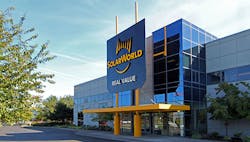SolarWorld AG’s U.S. unit joined a trade case asking the federal government to impose duties on low-cost imports that have fueled a nationwide boom in solar installations.
The company, which filed a separate trade complaint that led to U.S. tariffs on Chinese panels in 2012, become a co-petitioner Thursday in Suniva Inc.’s case before the U.S. International Trade Commission. Suniva, a bankrupt Georgia manufacturer, initiated the complaint in April, saying it’s impossible to compete with cheap imports, predominately from Asia.
The case threatens to upend the American solar market and has drawn vociferous opposition from the industry’s leading trade group. The duties Suniva is requesting would double the price of panels in the U.S. and hobble growth, analysts and industry advocates say. Yet Suniva and SolarWorld contend tariffs are necessary for them to compete with international rivals.
“We have hoped and waited for serious proposals for settling the overall U.S. solar industry’s trade tensions with China, but we have received none,” Juergen Stein, president of SolarWorld Americas, said in a statement. “Therefore, we have decided to join the case to pursue the best remedy available to us to restore fair competition in the U.S. market.”
Bankrupt German-based Solarworld AG owns a factory in Oregon.
Solar Soars in Recent Years
Solar installations in the U.S. have soared in recent years, largely because of low-cost panels imported from Asia. The price of photovoltaic cells within these panels has declined nearly 50% since 2012, according to Bloomberg New Energy Finance analyst Hugh Bromley.
SolarWorld and Suniva are the two largest U.S. manufacturers of polysilicon-based panels. Combined, they had the capacity to produce 1.5 gigawatts of solar modules and cells in 2016, accounting for 65% of U.S. production, according to Suniva’s ITC complaint.
That capacity, however, pales in comparison to the output of panel makers in China, where the largest company, JinkoSolar Holding Co., shipped 6.7 gigawatts last year.
The earlier trade case filed by Solarworld prompted the Commerce Department to impose duties of as much as 250% on solar cells produced in China.
Suniva has asked for import duties of 40 cents per watt for solar cells produced outside the U.S. and a floor price of 78 cents per watt for panels. That would more than double the price of cells, which currently sell for 25 to 33 cents per watt, depending on efficiency, Bromley said.
Endanger 260,000 U.S. Jobs
The Solar Energy Industries Association has warned that the move would devastate the industry, endangering an industry with 260,000 U.S. jobs. Suniva’s majority owner, China-based Shunfeng International Clean Energy Ltd., has also objected, saying the move is “not in the best interests” of clean energy markets.
The ITC will conclude its investigation by Sept. 22, and send its recommendations to President Donald Trump for a decision later this year.
“The potential damage to the solar industry as a result of this petition could kill many thousands of American jobs and put a stop to billions of dollars in private investment,” SEIA Chief Executive Officer Abigail Ross Hopper said in an emailed statement.
By Joe Ryan
About the Author
Bloomberg
Licensed content from Bloomberg, copyright 2016.
